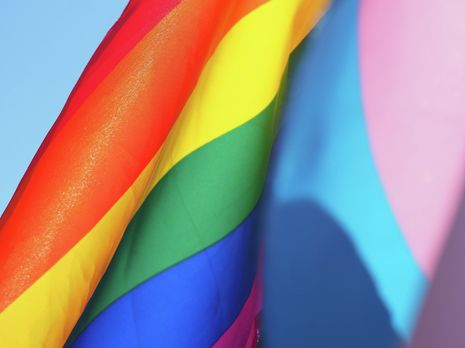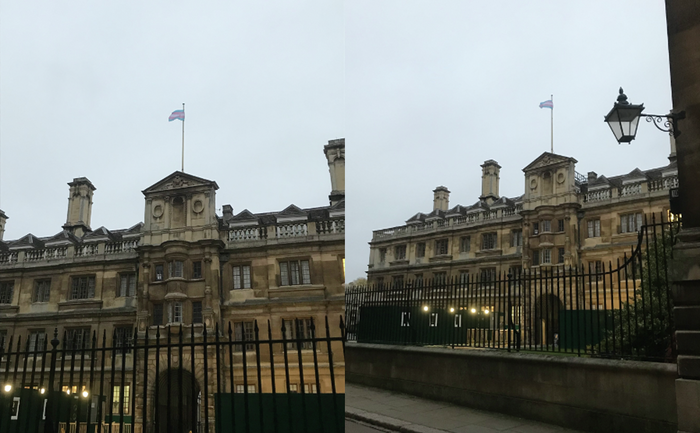No flag is a red flag
Akshata Kapoor explores the significance of flags to identity, and criticises the approach of colleges towards flag raising

Colleges’ past reactions to, resistance against, and strained conversation about flags being flown is an implicit recognition of the importance of these flags. I was understandably surprised when my request to my college to raise the Pan-African flag at the start of Black History Month (which has been done for some years now), was met with an assenting response alongside an unnecessary reminder that the flag is just a ‘small element’ of a more significant commemoration. Of course, a flag is a small part of larger movements and awareness campaigns, but the act of raising a flag is an important act itself, and the denial of this raising an even bigger sign.
The absence, the forced removal, of the Trans Flag raised by a group of students for Trans Day of Remembrance after Clare College denied the Union of Clare Students (UCS) permission to fly the flag probably felt much more significant to trans students in the college and University than a ‘small part’ of their identity. It is a denial of their visibility as trans students, their right to occupy space and remember the historical oppression of trans people. The students who raised the flag that was then removed said they did so “to remember trans and non-binary people lost to bigotry,” and that the “refusal of Clare College to fly the trans pride flag on the Trans Day of Remembrance, just as they had previously refused to fly the LGBT+ flag on other occasions, is an abhorrent and disgraceful political statement.”
Even when colleges grant permission, that JCR’s across the University have to seek permission in the first place, year after year, for pride flags to be raised on the same important dates is ridiculous. Just as colleges raise their college flags regularly on matriculation and other days, and raise their flags at half-mast on the passing away of Fellows, can they not routinely raise flags on the handful of important dates that their student communities have already fought for years to even be recognised?
“Flag raising cannot ever be said to be an insignificant act”
Flag raising cannot ever be said to be an insignificant act. Political signs and symbols on flags come attached with historical and political affiliations, national flags are loaded with political, cultural, and sometimes problematically jingoistic connotations, and sports teams flags can similarly inspire positive emotions and negative energies. Whether they are misused and manipulative or used positively, flags have the power to draw people together in their identification with what it represents.
However, I don’t think the malleable, uncontrollable meanings behind national and political flags can be compared to the significance of most liberation flags. To be affiliated with a political party is not an inalienable, intrinsic part of your identity, but your sexuality certainly is. Where most flags represent a psychological unity with others who recognise the flag, liberation flags serve this purpose while also reaffirming ones individual identity, a pride In their gender or sexuality or race that is recognised as existing in and of itself. LGBT+ and Trans flags represent a community established along fundamental aspects of their identity, in awareness of the problems they face, and in commemoration of the oppression faced by others who identify similarly. When an institution raises this flag, they simply recognise all these rights of the affected minority group, and the only political message they champion is one of equality and human rights.
When, earlier this year, Jesus College asked students to remove all flags and banners, liberation flags were targeted alongside other flags. Considering that the distinction between political and human rights causes can be made with a quick meeting, it feels careless on the part of colleges to champion a blanket ban of flags as a solution to any controversies arising from them. And if Jesus could “waive the section of a standard room license agreement which prohibits any flags to be flown for safety and maintenance reasons” during Pride month, there seems to be little reason to continue the role for the rest of the year.
“It is unique to liberation flags that they are not flags... of exclusion but rather of inclusion”
In fact, it is unique to liberation flags that they are not flags, unlike nationalistic and other flags, of exclusion but rather of inclusion. These are not governed by a set of criteria that alienate those who don’t fall under those remits, but instead form spaces of inclusion for historically marginalised communities. For members of trans and queer communities, seeing a raised flag is a recognition that their rights will be protected, that they belong to a safe space, one that recognises the validity of their identity. For members outside the community, the flag raises awareness about the existence, rights, and problems faced by the community, a crucial reminder of everyone’s responsibility to learn the meaning behind the flag. In many ways, flags like the Trans flag play an important role in defying the prevalence of ‘debates’ that still take place regarding identities that should not be up for discussion. Milo Eyre-Morgan, the Women’s Officer for the Cambridge SU, said in an interview with Varsity that “It’s always very frustrating to hear it referred to as...‘The Trans Debate’[…] because it’s not a debate or a thought experiment - it’s our lives and existence.” By raising a flag, institutions assert the indisputable, important space of minority community. Still, for people who choose not to recognise or learn about the flag, it does nothing to attack or even infringe upon their identities and politics.
From LGBT+ history month to Trans Day of Remembrance, a common theme across the flying of flags on important dates seems to be that the onus is always on students and JCRs: they have to fight for permission to raise flags, and if they fly them anyway, they risk getting reprimanded, if not worse. Clare College remains one of the few colleges to have never given permission to fly an LGBT+ flag on their pole, despite the hypocrisy pointed out by its students for using the flagpole for other flags. For colleges that have been raising these flags for some years now, it is only right that they take on the responsibility of raising these without continuous reminders from their student bodies. If they are truly committed to the purpose of the flags, colleges would realise that raising the flag is a sign of them caring about minority students in their community, not about students having to protect themselves.
 News / Cambridge study finds students learn better with notes than AI13 December 2025
News / Cambridge study finds students learn better with notes than AI13 December 2025 News / Cambridge Vet School gets lifeline year to stay accredited28 November 2025
News / Cambridge Vet School gets lifeline year to stay accredited28 November 2025 Science / Did your ex trip on King’s Parade? The science behind the ‘ick’12 December 2025
Science / Did your ex trip on King’s Parade? The science behind the ‘ick’12 December 2025 News / Uni Scout and Guide Club affirms trans inclusion 12 December 2025
News / Uni Scout and Guide Club affirms trans inclusion 12 December 2025 Arts / Modern Modernist Centenary: T. S. Eliot13 December 2025
Arts / Modern Modernist Centenary: T. S. Eliot13 December 2025









